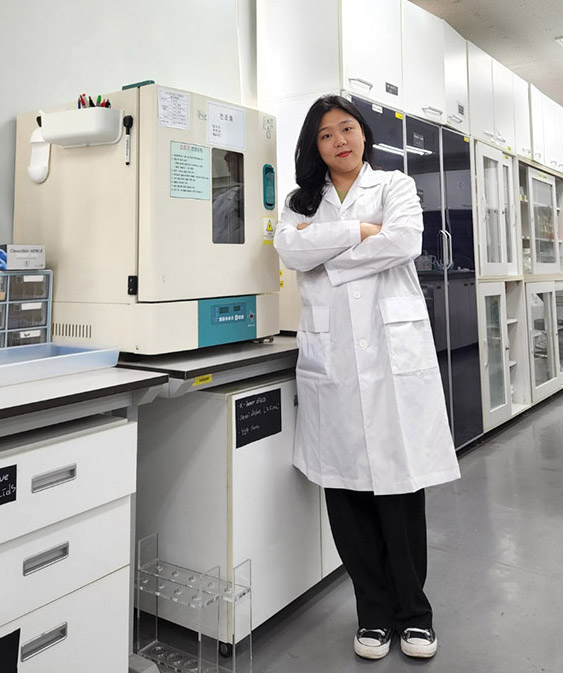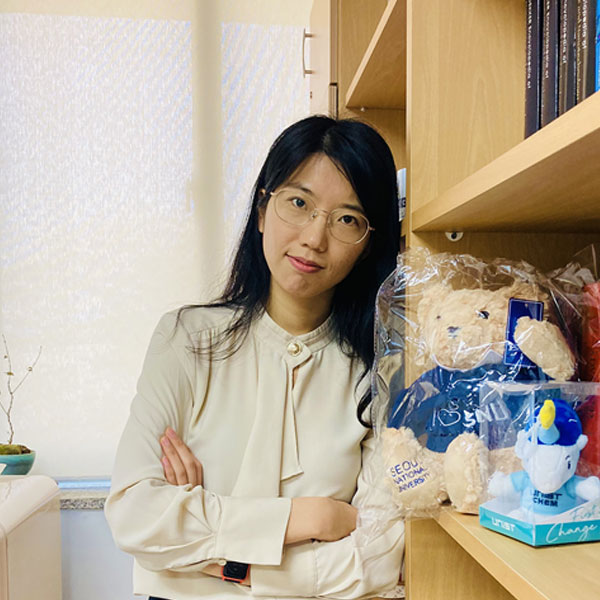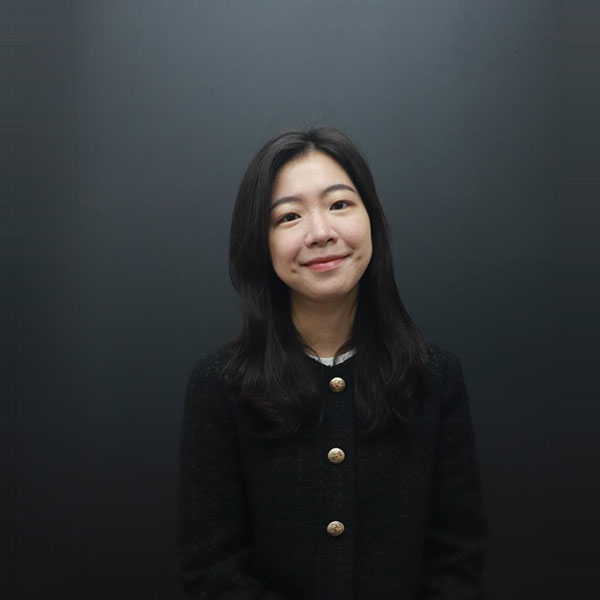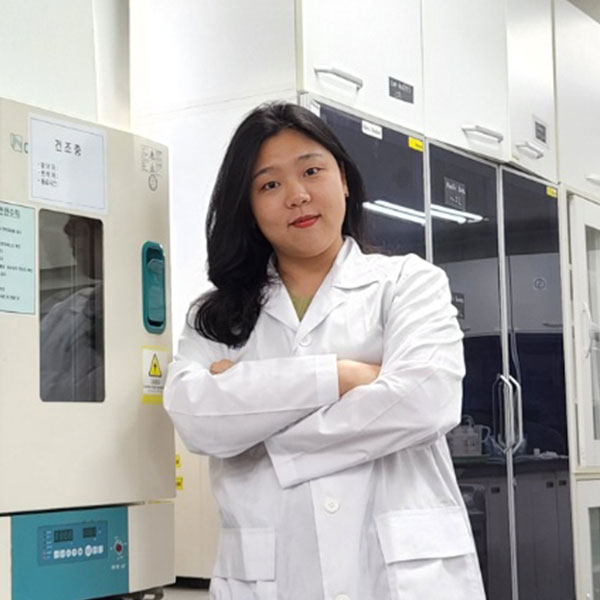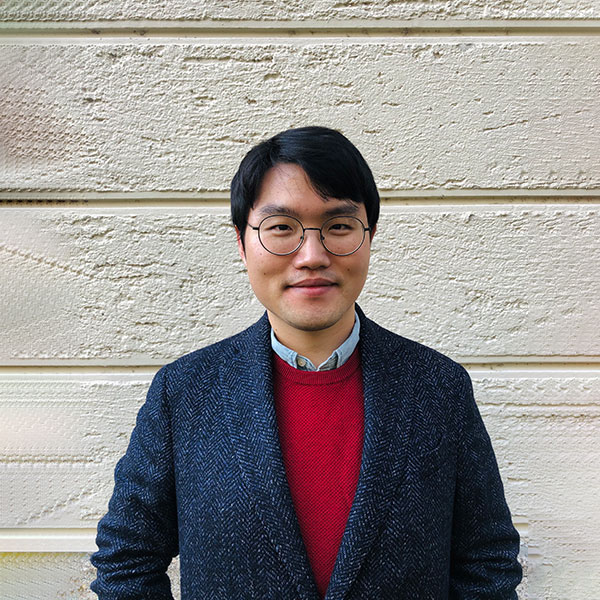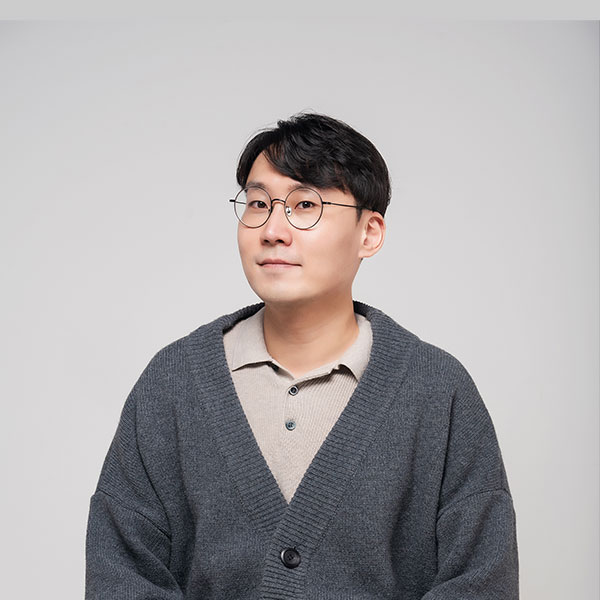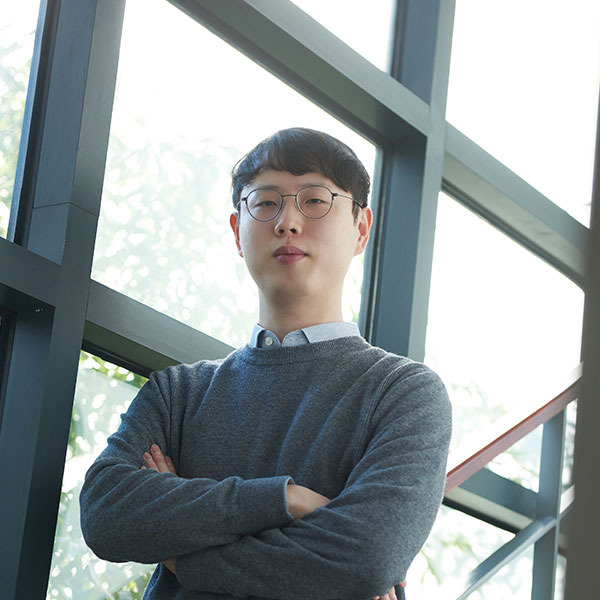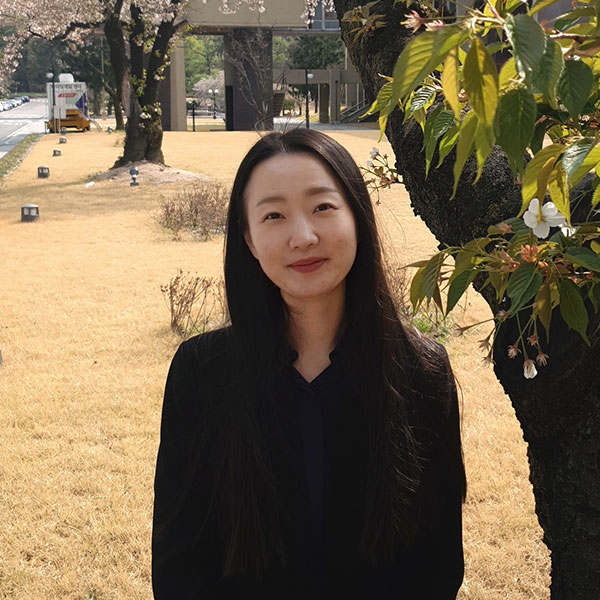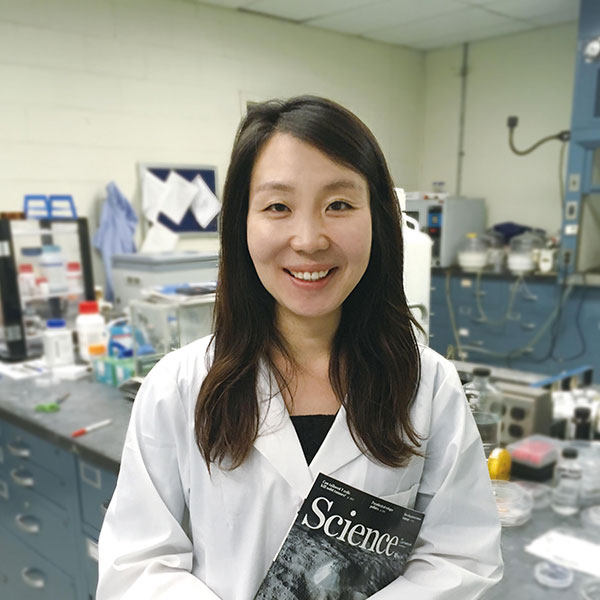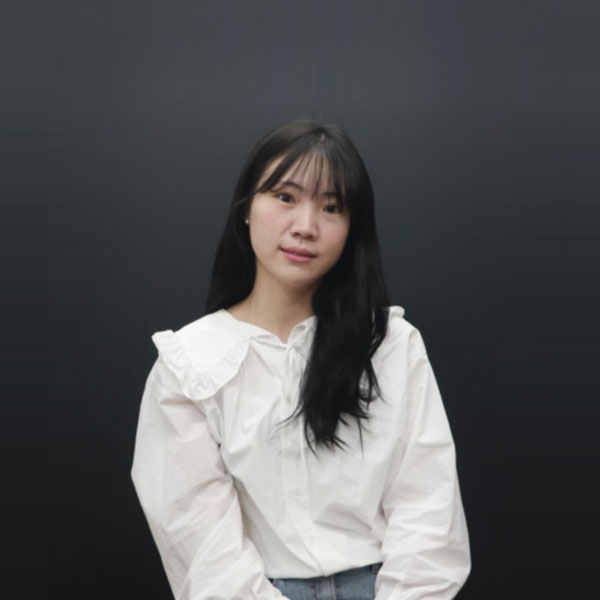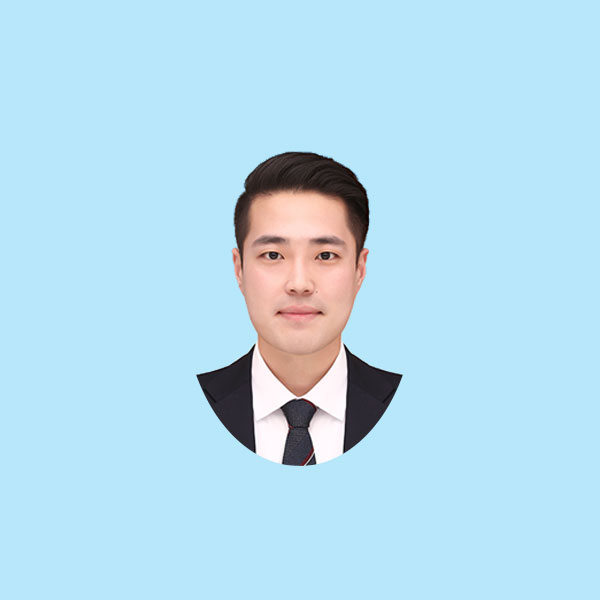What do you think are the strengths of UNIST Chemistry?
First, world-class faculty.
The greatest strength of the Department of Chemistry at UNIST is its excellent faculty. It is of course the best advantage to be able to meet professors in various fields within the big frame of chemistry, from professors with rich experience, skill, and years to new professors with brilliant insight and passion. Chemistry in detailed fields such as organic, inorganic, material, physics, nano, environment, industrial, computation, polymer, biochemistry, etc. is also divided into numerous branches according to each research topic. When you research one in a specific field, you might need to help of experts from other fields. However, it is quite difficult to obtain the opinions of experts in other fields. However, In UNIST, It is easier possible. The fact that you can seek advice face-to-face or collaborate with experts within walking distance is a ‘cheat key’ that allows you to quickly expand your knowledge and research experience. There are many professors who generously advise on issues that are difficult for students to face directly, such as experience at overseas institutions or companies and knowledgeable advice on practical research. I also have memories of when I visited the professor in the lab where I worked and other professors to ask questions. Each time, I felt grateful to the many professors who treated my problem as if they were their work.
Second, comfortable and optimized state-of-the-art laboratory environment and system.
Environmental conditions are the most basic premise for experiments. I think everyone knows that conditions are the ones that must be mentioned in the method of the experiment no matter what papers you read. Room temperature, proper humidity, exhaust systems, and chemical resistances are very basic conditions but are difficult to achieve in practice. In fact, there are many laboratories outdated and built for non-research purposes. In that place, the right to safety of workers working in laboratories is often not guaranteed. However, in the case of the laboratories of the Department of Chemistry at UNIST, as a research-oriented institute, they are designed and placed under a plan to provide an environment suitable for experiments. They not only lower the risk but also install and manage response safety devices so that they can cope with unexpected accidents. The wastewater and waste treatment system is an example of how safe and efficient a system is in place to conduct research. There is a systematically equipped system so that the researchers can fully focus on their research. It is a great advantage to increasing efficiency in actual research.
Third, access to various research equipment.
The practical advantage is that the access to the equipment operated by UNIST’s analysis center as a self-user, but also the access to the equipment directly managed by the Department of Chemistry. It is also very accessible to students that are the equipment owned by the professors’ laboratories of each chemistry department. It can be said that for those doing research, being able to operate a lot of equipment is a great opportunity to improve the skills available to them. For example, people who do synthesis very frequently use instruments such as NMR, XRD, or SEM. However, when you want to use equipment, Sometimes, you have to ask another organization or wait for a very long time because there is little or no equipment. However, the Department of Chemistry at UNIST also manages the reservation system well for joint devices. Regular training allows researchers to conduct experiments smoothly. The experience of actually operating the equipment affects the understanding of research and will be a skill list that you have then this accessibility is a special feature.
What was the most difficult part during your degree and how did you overcome?
During the degree period, students should quantitatively produce excellent research results in the form of papers, patents, prototypes, and academic presentations. In addition, I believe that they should improve their qualities as researchers through the process of setting a research topic, planning, experimenting, and modeling, determining error detection and strategy correction, and promoting conclusions on their own. Anything that hinders the achievement of these goals makes it difficult for students to earn their degrees. However, even more, difficult than that seems to be a situation where their mental state is shaken when they can’t believe in themselves because they are exhausted for various reasons. The most difficult time in my degree process was the moment when I lost confidence in myself, the mindset that is the foundation of my research.
There are many times when things don’t go as planned, and when the results aren’t as good as I’ve tried, I think a lot of people, including myself, look back to see if their abilities are lacking. Research is a constant recollection of what has been done. As a result, while looking for experimental errors or problems, there are cases when they think of themselves as the cause of the problem. ‘Is this the right way? Can I do it?’ This kind of thinking lowers your self-esteem and makes you lose the momentum to solve problems.
You will feel as if you are heading to an oasis in the middle of the desert without a single signpost. There are times when you feel like you are standing in place while running. In that case, I would like to tell you that you can stop for now. We can’t run every time, so we should better take time to stop and fully rest. Please be aware of the current situation and let them know that you need time to rest and recharge. Having a hobby is a good idea. It is good to exercise even for 10 minutes a day, and it is good to learn how to cook or bake. It is also a good way to go to see cultural performances such as concerts, plays, and musicals. Putting all of your heart and effort into learning and research can be a good thing for some. However, if you are too tired and exhausted, I think it is a way to close the door related to the topic for a while. Paying attention to other things can give you new inspiration or energy. I often felt depressed, as if I had fallen into a very deep abyss. I would walk for hours along the river to music, go to a show on the weekend, and just relax at home with nothing to recharge. These times gave me the strength to challenge myself, try again, and move forward.
Another way I’ve done to get through this crisis is to ‘tell my inner story’. Since you are the subject of the research, it is correct that you have to solve it yourself. But you don’t have to do everything alone. In my case, I tend to solve problems alone, I tried to solve research-related as well as non-research-related problems by myself. But now I know that’s a poor way that slows down troubleshooting and prevents me from finding more options when I have them. Share your concerns with mentors, colleagues, family members, lovers, and counselors. Because just talking can help you find new ways and solve emotional problems. I hope you can tell your story in a variety of ways. If you express and share opinions with words, writings, pictures, etc., the answer to the problem within me will eventually appear in front of your eyes.
What do you currently do after graduation?
I am currently working as a senior researcher in the Environmental Radioactivity Assessment Team at the Korea Atomic Energy Research Institute. I think the Korea Atomic Energy Research Institute might be unfamiliar to chemistry students. To briefly introduce the Korea Atomic Energy Research Institute, as the oldest national research institute in Korea. It is a comprehensive research institute that conducts nuclear power-related research such as the development of facilities that produce electricity using nuclear energy, the analysis research using neutrons, and the manufacture of nuclear fuel and medical isotopes. About 1,700 employees are engaged in R&D at the Daejeon head office, Jeongeup, and Gyeongju branch offices. In the future, branch offices will be set up in Gijang and Gampo, and various studies will be conducted.
The Environmental Radioactivity Assessment Team, where I work, is a Team specializing in environmental radiation evaluation around nuclear facilities. In nuclear facilities, it is necessary to check whether the radiation dose received from nearby residents through facility operation is maintained within the annual dose limit. It is a legal obligation to check the radiation dose and the detected concentration of radionuclides in the environment around nuclear facilities such as soil, rainwater, groundwater, and living organisms, and to report the results periodically. Our department carries out tasks such as environmental radiation/radiation investigation and evaluation, operation of the Nationally Certified Radiation Analysis System (KOLAS), research and development related to environmental radiation evaluation, and research on solving problems related to radiation/radiation. In R&D related to environmental radiation evaluation, we are optimizing the process from pretreatment to measurement, and are developing chemical pretreatment equipment for samples or measuring equipment used for evaluation and investigation.
I am conducting optimization research to improve the accuracy of analysis results, such as simplifying a multi-step complex chemical separation method or increasing the purity of a sample using my chemical background. For example, in order to capture radiocarbon in the air and make it into an analyzable purity and form, a gas sample in the form of the mixed gas is collected into a microporous adsorbent and then converted into carbonate form through heating and chemical treatment. The high-purity carbonate is reacted with acid again to be converted back into carbon dioxide, and then the sample is prepared by mixing it with the scintillation solution required for measurement. In this process, I am working on improving the purity of samples, simplifying procedures, and improving equipment. I am also developing adsorption materials for the separation or removal of specific radionuclides or ions. Resins capable of adsorbing and desorbing specific ions at specific pH have been developed and sold. However, most of these resins are manufactured and sold with overseas technology, so almost all of them must be imported. Efforts are being made to develop resins to localize these technologies. lastly, due to safety issues, efforts to investigate the trend of changes in the concentration of tritium in the environment and to respond to the changes are required. In order to detect tritium in a very low concentration environment, a technology for enrichment above a certain concentration is required. Recently, a technology for concentrating tritium using PEM (proton exchange membrane) electrolytic enrichment is being studied. By applying this technology, I am developing a device to concentrate tritium in environmental samples more quickly and accurately.
Based on my experience in synthesizing various organic/inorganic materials during the degree course and developing bench-level devices in the post-doctoral program, I am currently concentrating on material development, synthesis method optimization, and device development.
What is the most rewarding and happiest moment in your career?
The most rewarding and happiest moment as a researcher is when I achieve and solve our goals in a task or research with colleagues. The assignments have outcomes to be achieved according to yearly research goals and plans. Since I have to solve problems with limited time and money, it is very important to solve them efficiently. Therefore, results can usually be achieved only by working with multiple colleagues and collaborators to get the job done right and organically achieve a single goal. I feel the happiest and most rewarded when I use my abilities and do my part in such a situation.
Various experts gather and play their respective roles, so if any one of them fails to do its task, work progress will inevitably be disrupted. So, to achieve our goals and avoid harming others, I need to do my part properly. This is the responsibility I want to have and the trust I want to gain from others. No matter the size of the job, it’s important to communicate and collaborate because it’s something we do together. As a researcher, research and development is a profession and requires effort. It can be a pressure I have to deal with because no one can replace me right now. Nevertheless, the process of finding a solution to a problem and finding an answer is arduous but enjoyable.
I had the experience to solve a small problem with my co-worker about sample purity in the early days of work. In the course of optimizing the procedure of an analytical method, it was recognized that the purity of the synthetic sample, an intermediate, was low. To solve this problem, I started by having various discussions with a co-researcher who was in charge of optimizing the procedure. Because she knew the process of making the sample better than anyone and had tried many things, the explanation from a colleague who had the best knowledge was able to understand the problem more quickly. Based on this, I established my hypotheses and tried to estimate the cause. Among the various possible causes, we were able to extract the most probable ones together, and a literature search was conducted to confirm whether related issues have been studied. In particular, we focused on checking whether there are any possible side reactions during the reaction of synthesizing the sample. At the same time, XRD measurement was carried out to analyze the mixture of actual intermediates. In the case of XRD analysis, it was mainly performed during the degree course, so it could be used to solve this problem. As a result, it was confirmed that the mixture was composed of a total of 5 substances. And using the data, the mixing ratio was also confirmed by performing Rietveld refinement. Through literature research and experimental experience, we were able to come up with a way to remove unwanted foreign substances in the actual sample and finally solved the problem by actually experimenting.
Based on the experimental results of the practitioner, I was able to find the cause of the problem more quickly, and I was able to draw up a solution to the problem using my background knowledge. The sense of accomplishment that we solved the problem together served as an opportunity to increase our bond and trust with our colleagues. Because they faithfully fulfilled their respective roles, we were able to find answers smoothly and efficiently. I was able to understand the procedure more quickly by helping me understand the radiation/activity evaluation task, and it was a good experience moment for my fellow researcher to learn about equipment and analysis techniques that she had not used before.
Do you have any long-term goal or dream
I have now achieved the goal of the first chapter of my life. When I was in middle school, I talked with my friends about what it would be like to become an adult. At that time, I remember saying that I wanted to become a person earning more than 50 million won a year. At that time, that amount was a very large amount I thought, so I thought that if I could earn that kind of money, I would be able to do enough of the things I wanted to do and be able to help someone. When I was in high school, I admired the teacher who taught me chemistry 2. The teacher had laboratory experience when she was in university, and she would often share that experience. That’s when I thought, ‘I want to try something like that.’ As I made up my mind, I went to university to major in chemistry, and I had the opportunity to do real experiments. MOF (Metal-Organic Frameworks), the first thing I learned during the inorganic chemistry experiment class, was a whole new world. When I looked at what was happening in a very small place that was invisible to the eye, it was as if I had entered a different world of a completely different dimension, and I wanted to study such a world. It was really daunting to go to graduate school and enter a laboratory researching MOFs to create something that did not exist in the world. It was a lot of fun to design, predict, and actually synthesize my own compositions and see the results. During the 7 years of research that I enjoyed, I laughed, cried, rejoiced, and frustrated a lot. And when my name was engraved in gold on the solid black cover, I was a little vain, a little scared, and a little excited. It was because I felt that time flew by, I was nervous about whether I would be able to stand on my own as a researcher, and I was excited to move into a new society. Life as a postdoctoral researcher who challenged me to try to work in a different field was like starting my degree again from the beginning. I thought that I would like to do my research more stably while studying, experimenting, and collaborating with other institutions or companies in other fields that I had not done before. When it was my third year like that, I was placed in the current research institute. I have become someone who makes chemistry-based research. The blueprints I drew as a child became more and more concrete and goals, and the efforts I made to achieve them paid off.
I have just achieved my 35-year goal, which I explained in one above paragraph. So I am making the following goals for the next 30 years. As a novice researcher, I think the goal I set for myself is perhaps that of all people who do research. I want to make the materials, technologies, equipment, and methods I have developed so that more people can use them. My research goal is to develop real practical and usable materials together with my colleagues and inform more people. Although there are many excellent researchers, materials in many fields are still influenced by foreign technology. I will strive to use materials stably without being interfered with by circumstances outside of research, aiming for the domestication of materials and technology. Also, I will try to increase my ability so that I can play a role as a leader who leads many capable colleagues. My goal as a researcher is to become a colleague who someone wants to work with and share opinions with. The watch does not run alone. Numerous parts and mainspring work together when they fit into place. My goal for the future is to become a piece that can be the first among them to say let’s start together. I hope that someday when that dream comes true, I will have the opportunity to tell you again that I have achieved the goal of the second chapter of my life.
As a UNIST graduate, what advice would you give to students?
I don’t think I’m qualified yet to give advice to those of you who are already studying and researching too hard and doing your best to pursue your dreams. So, if I could tell a story to the 25-year-old me when I first entered graduate school(to me 10 years ago), I thought about what I would say. I will replace it with the letter below.
I am you in 10 years. What will I be doing in 10 years? I used to joke around with my co-workers. After 10 years, someone achieves a degree and becomes a professor, a researcher, an office worker, and a business, each of them doing their best in various places, demonstrating their abilities.
I am similar to the person you imagined but quite different. I become a researcher, whom you have dreamed of since you are little, and have a business card. It is a totally different thing! but it’s similar to still studying new things and drawing a line on articles. There are more days when I go to work on time and leave on time than then. Then, when work suddenly rushes in, it’s similar to working overtime. I think the lunch box bought on the Internet tastes better. I thought I would spend my time cooking, but these days, meal kits are coming out really well. So it’s okay if you can’t cook. You can’t do everything well, so let’s work hard on what we’re good at. Even after 10 years, it’s still full of difficult things like you now. I’m not like an adult and I’m clumsy, so I rip my hair out several times a day. I’m very happy though. I can do what I like, and I am happy because it is something I enjoy doing. I think I could have come this far because you worked hard.
You’re a student, but you think you had a lot of responsibilities as an adult. So whether you’re taking a big career path, choosing a research topic, or just choosing what to have for dinner, you’re going to have to think a lot more when you have to decide something like this. But I want you to remember that it may not necessarily be the best choice. You might kick the blanket off the blanket when rising memories that you did mistakes, and you might even regret it. And of course, you can give up. but it’s ok Because there is not necessarily only one way. Giving up doesn’t mean losing, it’s just making a different choice, so I hope you don’t feel too burdened. Still, I hope you at least choose the one that makes you happier when you make that choice. I hope you choose something more enjoyable. Even if your body is tired and your head is pounding, I want you to do something that makes your heart pound and makes you smile. In the end, that’s what gets you moving.
I hope you have more fun with your colleagues around you. It’s nice to hang out with people in the same lab, but sometimes you can fight. As you bump into each other every day, there are days when you firmly agree and there are times when you don’t. In this case, I hope you will put a lot of thought and effort into how to deal with it. I hope you get along well with people from other labs who are doing research in a field other. There may come a day when you will collaborate with them in the future. Say hello to each other, and talk about what you are doing. Then, when you communicate with them, new thoughts come to your mind and you feel at ease. All your great colleagues will be your great asset and strength.
You have done well so far and will continue to do well in the future. Actually, it’s okay if you can’t do it, it’s all good as it is, so I want you to experience it happily, happily, and experience many unexpected things with excitement. I hope your time at UNIST will be filled with precious and enjoyable memories.
